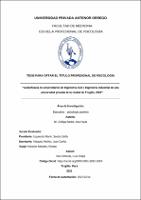Mostrar el registro sencillo del ítem
Autoeficacia en universitarios de ingeniería civil e ingeniería industrial de una universidad privada de la ciudad de Trujillo, 2020
| dc.contributor.advisor | Isla Ordinola, Luis Felipe | |
| dc.contributor.author | Zuñiga Bartra, Ana Paula | |
| dc.creator | Zuñiga Bartra, Ana Paula | |
| dc.date.accessioned | 2022-01-02T21:55:08Z | |
| dc.date.available | 2022-01-02T21:55:08Z | |
| dc.date.issued | 2022 | |
| dc.identifier.uri | https://hdl.handle.net/20.500.12759/8483 | |
| dc.description.abstract | El presente estudio tuvo como objetivo establecer si existen diferencias significativas en los niveles de autoeficacia entre los estudiantes de ingeniería civil y los estudiantes de ingeniería industrial de una universidad privada de la ciudad de Trujillo, 2020. Para medir los niveles de autoeficacia de los universitarios se utilizó el instrumento denominado escala de autoeficacia percibida específica de situaciones académicas, el tamaño de la muestra fue de 242 y estuvo conformada por estudiantes del IX y X ciclo de ingeniería industrial (124) e ingeniería civil (118). Luego, para hallar las diferencias significativas entre los niveles de autoeficacia de los estudiantes, considerando que el tamaño de la muestra fue mayor a 25, se utilizó el estadístico Z. En esta investigación se concluyó que no existen diferencias significativas en los niveles de autoeficacia entre los estudiantes de ingeniería civil y los estudiantes de ingeniería industrial, deduciendo que la carrera profesional no sería una variable influyente, sin embargo, se halló que sí existen diferencias significativas en los niveles de autoeficacia entre los hombres de ingeniería civil y las mujeres de ingeniería civil, además, se halló que sí existen diferencias significativas en los niveles de autoeficacia entre los hombres de ingeniería industrial y las mujeres de ingeniería industrial, lo que demuestra que la variable género es relevante en la percepción de la autoeficacia entre los estudiantes universitarios. | es_PE |
| dc.description.abstract | The objective of this study was to establish whether there are significant differences in the levels of self-efficacy between civil engineering students and industrial engineering students from a private university in the city of Trujillo, 2020. To measure the selfefficacy levels of university students, used the instrument called the scale of perceived self-efficacy specific to academic situations, the sample size was 242 and it was made up of students from the IX and X cycles of industrial engineering (124) and civil engineering (118). Then, to find the significant differences between the students' self-efficacy levels, considering that the sample size was greater than 25, the Z statistic was used. In this research it was concluded that there are no significant differences in the self-efficacy levels between civil engineering students and industrial engineering students, deducing that the professional career would not be an influential variable, however, it was found that there are significant differences in the levels of self-efficacy between civil engineering men and civil engineering women, and it was found that there are significant differences in the levels of self-efficacy between men in industrial engineering and women in industrial engineering, which shows that the gender variable is relevant in the perception of self-efficacy among university students. | en_US |
| dc.description.uri | Tesis | es_PE |
| dc.format | application/pdf | es_PE |
| dc.language.iso | spa | es_PE |
| dc.publisher | Universidad Privada Antenor Orrego - UPAO | es_PE |
| dc.relation.ispartofseries | T_PSI_305 | |
| dc.rights | info:eu-repo/semantics/closedAccess | es_PE |
| dc.rights.uri | https://creativecommons.org/licenses/by/4.0/ | es_PE |
| dc.source | Universidad Privada Antenor Orrego | es_PE |
| dc.source | Repositorio Institucional - UPAO | es_PE |
| dc.subject | Autoeficacia | es_PE |
| dc.subject | Estudiantes universitarios | es_PE |
| dc.subject | Ingeniería civil | es_PE |
| dc.subject | Ingeniería industrial | es_PE |
| dc.title | Autoeficacia en universitarios de ingeniería civil e ingeniería industrial de una universidad privada de la ciudad de Trujillo, 2020 | es_PE |
| dc.type | info:eu-repo/semantics/bachelorThesis | es_PE |
| thesis.degree.grantor | Universidad Privada Antenor Orrego. Facultad de Medicina Humana | es_PE |
| thesis.degree.name | Psicólogo | es_PE |
| thesis.degree.discipline | Psicología | es_PE |
| dc.subject.ocde | http://purl.org/pe-repo/ocde/ford#5.01.02 | es_PE |
| renati.advisor.orcid | https://orcid.org/0000-0001-5932-100X | es_PE |
| renati.author.dni | 74703825 | |
| renati.advisor.dni | 40664722 | |
| renati.type | http://purl.org/pe-repo/renati/type#tesis | es_PE |
| renati.level | http://purl.org/pe-repo/renati/level#tituloProfesional | es_PE |
| renati.discipline | 313016 | es_PE |
| renati.juror | Izquierdo Marin, Sandra Sofia | |
| renati.juror | Vasquez Muñoz, Juan Carlos | |
| renati.juror | Honores Morales, Renato | |
| dc.publisher.country | PE | es_PE |
Ficheros en el ítem
Este ítem aparece en la(s) siguiente(s) colección(es)
-
Psicología [435]


